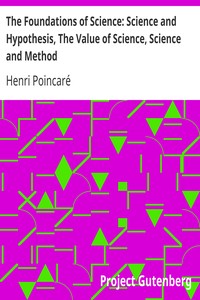The Foundations of Science: Science and Hypothesis, The Value of Science,…
"The Foundations of Science" by Henri Poincaré is a significant scientific publication likely written in the early 20th century. The text serves as a comprehensive exploration of the philosophical underpinnings of scientific inquiry, emphasizing the roles of hypotheses, mathematics, and the evolution of scientific thought. Poincaré investigates the relationship between mathematical reasoning and empirical experience, questioning the nature of scientific truths and the constructs of mathematical concepts. The opening of the book
introduces the challenges in understanding mathematical reasoning, particularly whether it is purely deductive or if it draws on inductive elements. Poincaré critiques common assumptions about the certainty of mathematics and scientific laws, presenting the idea that much of mathematics relies on creative and constructive thinking rather than rigid logic. He proposes that concepts like continuous quantities and geometrical principles demonstrate how human thought shapes our understanding of science. This sets the stage for a deeper examination of the evolution of scientific methods and philosophies that will follow in the subsequent chapters. (This is an automatically generated summary.)
Read or download for free
| How to read | Url | Size | |||
|---|---|---|---|---|---|
| Read now! | https://www.gutenberg.org/ebooks/39713.html.images | 1.3 MB | |||
| EPUB3 (E-readers incl. Send-to-Kindle) | https://www.gutenberg.org/ebooks/39713.epub3.images | 554 kB | |||
| EPUB (older E-readers) | https://www.gutenberg.org/ebooks/39713.epub.images | 568 kB | |||
| EPUB (no images, older E-readers) | https://www.gutenberg.org/ebooks/39713.epub.noimages | 522 kB | |||
| Kindle | https://www.gutenberg.org/ebooks/39713.kf8.images | 1.1 MB | |||
| older Kindles | https://www.gutenberg.org/ebooks/39713.kindle.images | 1.0 MB | |||
| Plain Text UTF-8 | https://www.gutenberg.org/ebooks/39713.txt.utf-8 | 1.1 MB | |||
| Download HTML (zip) | https://www.gutenberg.org/cache/epub/39713/pg39713-h.zip | 520 kB | |||
| There may be more files related to this item. | |||||
Similar Books
About this eBook
| Author | Poincaré, Henri, 1854-1912 |
|---|---|
| Author of introduction, etc. | Royce, Josiah, 1855-1916 |
| Translator | Halsted, George Bruce, 1853-1922 |
| LoC No. | 14000204 |
| Title | The Foundations of Science: Science and Hypothesis, The Value of Science, Science and Method |
| Note | Reading ease score: 54.7 (10th to 12th grade). Somewhat difficult to read. |
| Note | Wikipedia page about this book: https://en.wikipedia.org/wiki/The_Value_of_Science |
| Credits |
Produced by Bryan Ness and the Online Distributed Proofreading Team at http://www.pgdp.net (This book was produced from scanned images of public domain material from the Google Print project.) |
| Language | English |
| LoC Class | Q: Science |
| Subject | Science -- Methodology |
| Subject | Science -- Philosophy |
| Subject | Mathematics -- Philosophy |
| Category | Text |
| EBook-No. | 39713 |
| Release Date | May 16, 2012 |
| Most Recently Updated | May 17, 2012 |
| Copyright Status | Public domain in the USA. |
| Downloads | 550 downloads in the last 30 days. |
| Project Gutenberg eBooks are always free! | |


